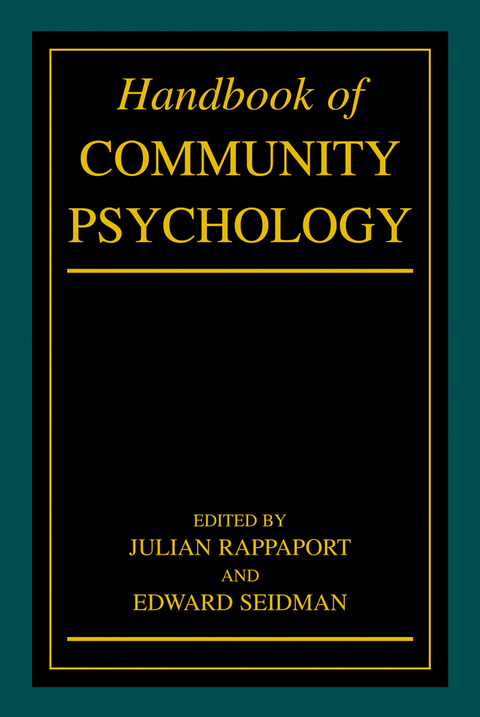
Handbook of Community Psychology
Kluwer Academic/Plenum Publishers (Verlag)
978-0-306-46160-6 (ISBN)
As a field progresses, people write about their own work in journals, chapters, and books; but periodically the work needs to be collected and organized. It needs to be brought together in a format that can both introduce new members to the field and reacquaint continuing members with the work of their colleagues. Such a collection also affords an opportunity for the growing number of people with particular expertise to provide a reference for others whose work is related, but differs in focus. This is the first Handbook of Community Psychology. It contains contributions from 106 different authors, in addition to our editorial introductions. Its thirty-eight chapters (including two that are divided into multiple, individually authored parts) are concerned with conceptual frameworks, empirically grounded constructs, intervention strategies and tactics, social sys tems, design, assessment and analysis, cross-cutting professional issues, and contemporary intersections with community psychology. Although interrelated, each chapter stands on its own as a statement about a particular part of the field, and the volume can serve as a reference for those who may want to explore an area about which they are not yet familiar. To some extent community psychologists eschew the distinction between researcher and practitioner; and regardless of one's primary work environment (university, small college, practice setting, government, or grassroots organiza tion), there is something of interest for anyone who wants to explore the community psychol ogy approach.
I. Concepts, Frameworks, Stores, and Maps.- 1. Prevention in Mental Health and Social Intervention: Conceptual and Methodological Issues in the Evolution of the Science and Practice of Prevention.- 2. Empowerment Theory: Psychological, Organizational, and Community Levels of Analysis.- 3. Individualism, Collectivism, and Community Psychology.- 4. Community Psychology and Routes to Psychological Wellness.- 5. Toward an Integration of Behaviorism and Community Psychology: Dogs Bark at Those They Do Not Recognize.- 6. Cognition in Social Context: Contributions to Community Psychology.- 7. Understanding and Changing Social Systems: An Ecological View.- II. People in Context: Empirically Grounded Constructs.- 8. Psychological Dysfunction and Well-Being: Public Health and Social Indicator Approaches.- 9. Stress: Theory, Research, and Action.- 10. Social Support Research in Community Psychology.- 11. Citizen Participation and Community Organizations.- 12. Power and Participation in the Workplace: Implications for Empowerment Theory, Research, and Practice.- III. Intervention Strategies and Tactics.- 13. Contextual Influences in Mental Health Consultation: Toward an Ecological Perspective on Radiating Change.- 14. Community and Neighborhood Organization.- 15. The Creation of Alternative Settings.- 16. Action-Oriented Mass Communication.- 17. Social Policy and Community Psychology.- 18. Dissemination of Innovation as Social Change.- IV. Social Systems.- 19. Prospects for a Viable Community Mental Health System: Reconciling Ideology, Professional Traditions, and Political Reality.- 20. Community-Based Health Interventions.- 21. Religion in American Life: A Community Psychology Perspective.- 22. Community Change, Community Stasis, and the Law.- 23. Helping Troubled Children and Families: A Paradigm of Public Responsibility.- 24. The School Reform Movement: Opportunities for Community Psychology.- 25. Self-Help Groups.- 26. Contributions from Organizational Psychology.- V. Design, Assessment, and Analytic Methods.- 27. Assessing Ecological Constructs and Community Context.- 28. Cross-Level Research without Cross-Ups in Community Psychology.- 29. Statistical Models for Change.- 30. Thinking through Others: Qualitative Research and Community Psychology.- VI. Cross-Cutting Perspectives and Professional Issues.- 31. Practitioners Perspectives.- 32. Community Psychology in International Perspective.- 33. Psychology in the International Community: Perspectives on Peace and Development.- 34. Community Psychology and Ethnic Minority Populations.- 35. Women’s Empowerment: A Review of Community Psychology’s First Twenty-Five Years.- 36. A Perspective on Ethical Issues in Community Psychology.- 37. Barometers of Community Change: Personal Reflections.- VII. Contemporary Intersections with Community Psychology.- 38. Contemporary Intersections.
| Erscheint lt. Verlag | 31.5.2000 |
|---|---|
| Zusatzinfo | XXIII, 1011 p. In 2 volumes, not available separately. |
| Verlagsort | New York |
| Sprache | englisch |
| Maße | 178 x 254 mm |
| Themenwelt | Geisteswissenschaften ► Psychologie ► Psychoanalyse / Tiefenpsychologie |
| Geisteswissenschaften ► Psychologie ► Sozialpsychologie | |
| ISBN-10 | 0-306-46160-9 / 0306461609 |
| ISBN-13 | 978-0-306-46160-6 / 9780306461606 |
| Zustand | Neuware |
| Haben Sie eine Frage zum Produkt? |
aus dem Bereich


